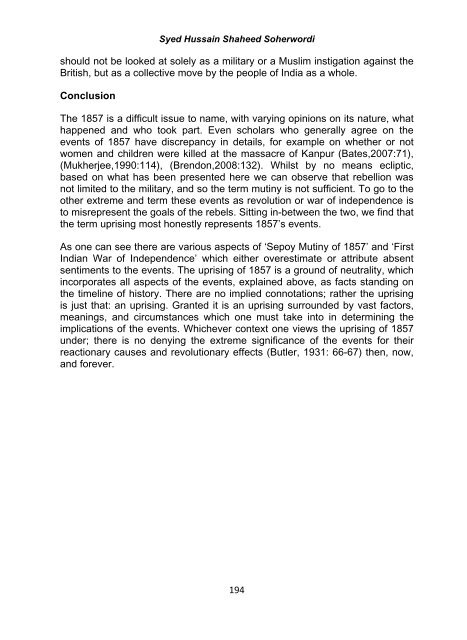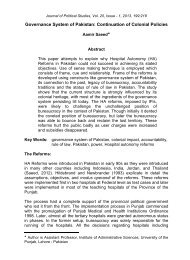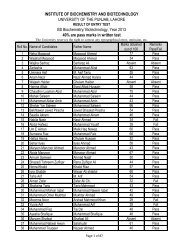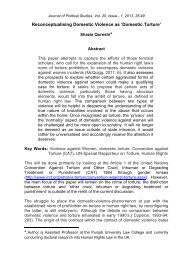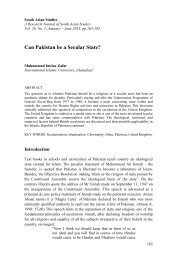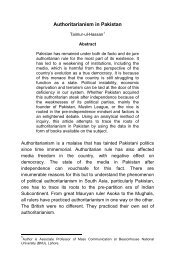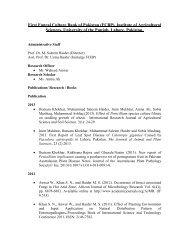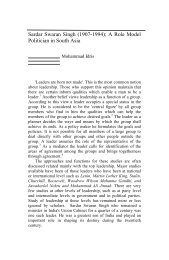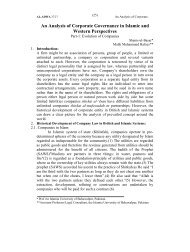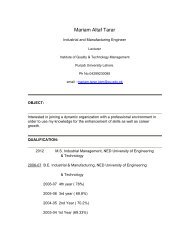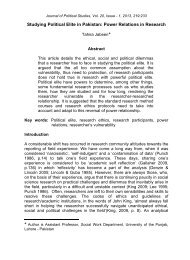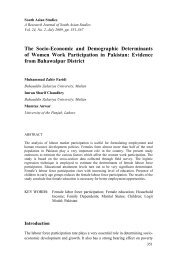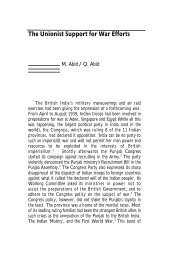The Significance of the Different Names Applied by Historians to the ...
The Significance of the Different Names Applied by Historians to the ...
The Significance of the Different Names Applied by Historians to the ...
You also want an ePaper? Increase the reach of your titles
YUMPU automatically turns print PDFs into web optimized ePapers that Google loves.
Syed Hussain Shaheed Soherwordi<br />
should not be looked at solely as a military or a Muslim instigation against <strong>the</strong><br />
British, but as a collective move <strong>by</strong> <strong>the</strong> people <strong>of</strong> India as a whole.<br />
Conclusion<br />
<strong>The</strong> 1857 is a difficult issue <strong>to</strong> name, with varying opinions on its nature, what<br />
happened and who <strong>to</strong>ok part. Even scholars who generally agree on <strong>the</strong><br />
events <strong>of</strong> 1857 have discrepancy in details, for example on whe<strong>the</strong>r or not<br />
women and children were killed at <strong>the</strong> massacre <strong>of</strong> Kanpur (Bates,2007:71),<br />
(Mukherjee,1990:114), (Brendon,2008:132). Whilst <strong>by</strong> no means ecliptic,<br />
based on what has been presented here we can observe that rebellion was<br />
not limited <strong>to</strong> <strong>the</strong> military, and so <strong>the</strong> term mutiny is not sufficient. To go <strong>to</strong> <strong>the</strong><br />
o<strong>the</strong>r extreme and term <strong>the</strong>se events as revolution or war <strong>of</strong> independence is<br />
<strong>to</strong> misrepresent <strong>the</strong> goals <strong>of</strong> <strong>the</strong> rebels. Sitting in-between <strong>the</strong> two, we find that<br />
<strong>the</strong> term uprising most honestly represents 1857’s events.<br />
As one can see <strong>the</strong>re are various aspects <strong>of</strong> ‘Sepoy Mutiny <strong>of</strong> 1857’ and ‘First<br />
Indian War <strong>of</strong> Independence’ which ei<strong>the</strong>r overestimate or attribute absent<br />
sentiments <strong>to</strong> <strong>the</strong> events. <strong>The</strong> uprising <strong>of</strong> 1857 is a ground <strong>of</strong> neutrality, which<br />
incorporates all aspects <strong>of</strong> <strong>the</strong> events, explained above, as facts standing on<br />
<strong>the</strong> timeline <strong>of</strong> his<strong>to</strong>ry. <strong>The</strong>re are no implied connotations; ra<strong>the</strong>r <strong>the</strong> uprising<br />
is just that: an uprising. Granted it is an uprising surrounded <strong>by</strong> vast fac<strong>to</strong>rs,<br />
meanings, and circumstances which one must take in<strong>to</strong> in determining <strong>the</strong><br />
implications <strong>of</strong> <strong>the</strong> events. Whichever context one views <strong>the</strong> uprising <strong>of</strong> 1857<br />
under; <strong>the</strong>re is no denying <strong>the</strong> extreme significance <strong>of</strong> <strong>the</strong> events for <strong>the</strong>ir<br />
reactionary causes and revolutionary effects (Butler, 1931: 66-67) <strong>the</strong>n, now,<br />
and forever.<br />
194


